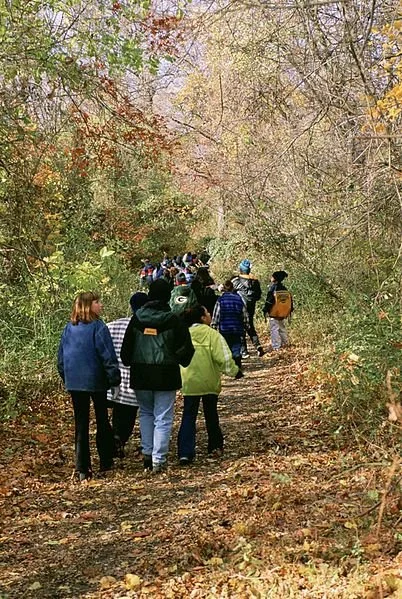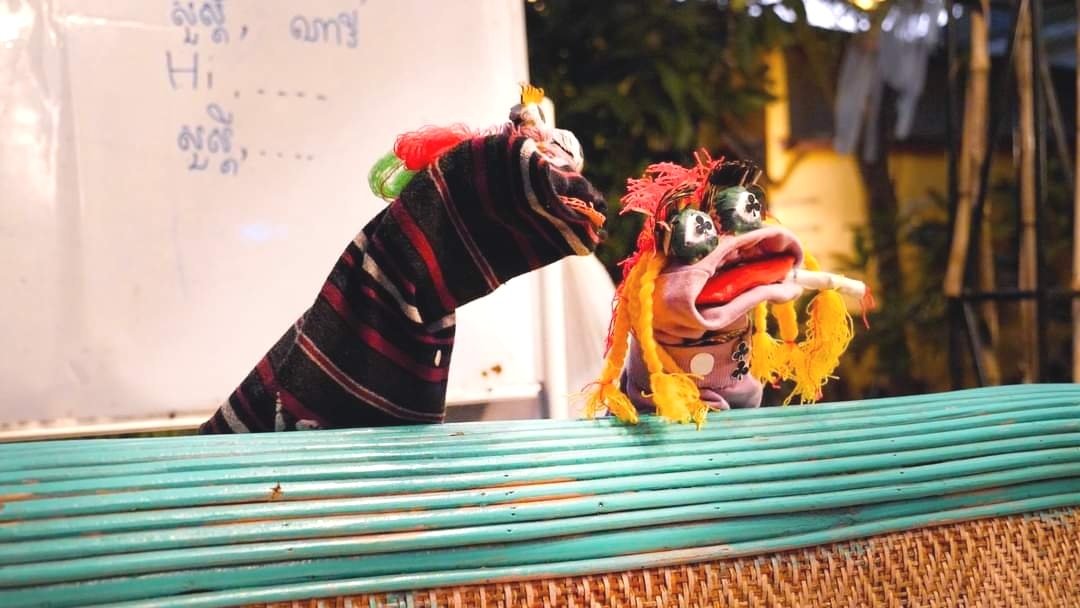Out in Nature (Page Under construction. We haven’t fully gone bush, so to speak.)
Goal: Enticing young people to love, respect and step in to protect nature…
How: Adapt Outdoor games, activities and Event Days by building in some form of environmental purpose, sensitivity or message.
-

Kids' outdoor game (Ages 7 and up)
How:
Children get together in pairs, and one is blindfolded while the other one acts as guide (for safety) – while they wander around the garden. The blindfolded child is assisted by their guide to identify through their sense of touch and smell -
(a) flowering/ pollination plants or trees (b) habitat plants and structures – such as hollowed out places for skinks, lizards and (c) to locate shadey spots vs sunny spots and all manner of elements in nature having symbiotic relationships. This game gets young people in touch with the interconnected nature of their outdoor surroundings and gets them talking about the importance of protecting each key element.
Later on, the children can build on this experience to create a sense of wonder by telling stories around the things they have learnt - it might be a story told first hand by the lizard whose rocks and stones were kicked on to the path by the unruly teenage boy, who was cross because he lost his football. Along came the mother who chastised the boy for messing up the garden, and he was told he wouldn’t be allowed another football until he restored the rocks to their rightful place. Happy ending for the lizard and worms who rely on the habitat of these protective features.
Here are three of our Presentations - a tad old, but certainly still relevant - Making Environmental Education Fun, Creative and Memorable
Slideshare ‘Powerpoint’ presentations about the role of play in environmental education.
-

More games Ages 7 and up
How:
Here is a game for children from Green Teacher Magazine Issue 93 - entitled 'Amphibians and Two Game Structures' (may need to subscribe to this content of the magazine). The game involves considerable exercise, frog habitat information and a lot of competitive spirit! Discussion about specific frog species should be adapted to the particular location of the classroom. Game will need to be simplified for littlies.
See also this link to the idea of role-playing various species - to enable the child to consider the needs of the animal for shelter (habitat), for food etc - When Nature Speaks also sourced from Green Teacher.com.
Middle-School children can collect used PET bottles and cut them up and turn them in to mini green houses in pots, as seen in photo courtesy of Dirt Girl World (great stuff DGW - Australia) or possibly this photo was taken at Sustainable Gardening Australia or CERES Melbourne (apologies - memory can be appalling).
Green Teacher Mag is a great resource for anything about Nature Deficit Disorder, and getting kids out in to nature with lots of outdoorsy activities.
Also check out the Endangered Species Game we suggest below under Holiday Programme Activities.
Goal: Encourage Research in to Inspiring and/or Fun Facts
Students of all ages create content for QUIZZES about anything cheeky and fun in nature, such as the mating habits of animals/fish/ reptiles. Fun dress-ups, play-acting and games can add to the fun for the littlies while learning how the endangered animals stay in their packs or roam alone, to find a mate, as the case may be.
How: To highlight the delicate balance the Species maintains its existence, a Reality TV game of Bachelorette Orangutan or Bachelor Gorilla could be acted out around the endangered species and their cohabitation habits. Play-acting : Polar Bear Alone should conjure up the effort involved in survival in their world of perpetual isolation. The same applies to the Emperor Penguins who are facing extinction due to low ice replenishment, and the near starvation of the fathers who risk all to huddle (incubate) their young while the Mothers go off in search of fish, squid, and krill. This is now proving extremely challenging due to warmer waters and reduced fishing areas and many of the chick eggs are not surviving as a result.
Students can develop their public speaking, as well as Show and Tell Skills, discussing how they upcycle or reduce consumption at home - A funny topic might be how much ‘loo or dunny paper’ gets consumed at home. (Certainly, more amusing for youngsters than talking about how often they switch off the light, when they leave the bedroom). Quizzes can be constructed around jolly topics such as methane gases emitted by cattle consumption, queer sewerage facts, or recycled toilet paper consumed (and again comparisons around consumption of toilet paper, across States or Countries – you'd be surprised which nation's bottoms 'need' the most wiping!) Kids love anything that is smelly and a little disgusting or embarassing.
Here is a link to the amazing facts about Whale Poo!
See Also other Education pages for Quizz ideas.
Peer to Peer education is helpful, and possibly necessary in this context, when large groups of children from different age groups can support the learning and motivation of younger pupils, and relieve the teacher or parent burden. This works well at Children’s Parties, School Camps and Family Holidays and games can be more fun with a wider age-group.
For the Middle Years and Senior Years - those interested in Philosophy, Theology or Religious Studies (Religious Instruction, in ‘my’ day), can hold special events - Bonfires with Story-Telling sessions, Treasure Hunts and Scavenger Hunts, Markets/Music/Cultural Festivals honouring spiritually significant days.
If it suits the group, why not build in to these events a study of approaches to protecting and honouring Nature across different cultures. Research will take in Animist, Buddhist, Hindu and other faiths and their forms of nature deference /obeisance. Examine how Offerings (humane Sacrifices) can be made, and the various Festivals and Sacred Days (Diwali) that are marked.
The idea of a Treasure Hunt could build in an Introductory Fact Sheet with Questions and Answers to be unravelled along the Hunt, and Clues and Hints along the way, answering deeper questions about the Earth, how cultures have protected their ecology and Stories told to inspire their young, and the Hunt includes items from nature to be located (find the boulder at the front of the rain garden to locate the note wound around a rock which leads to the next clue tied to the Insect Hotel). The students will have much fun developing the Treasure Hunt themselves. (The same could be based around a more involved Game of Find/Hide and Seek).
Read about mystical beliefs that relate to the protection of the Earth such as Varaha - the Avatar of the Hindu Deity Vishnu - associated with the legend of raising the Earth (Bhudewi) out of the Cosmic Ocean and restoring her to her rightful place in the Universe. Or in Greek Mythology, there is the Titan God Atlas and Heracles and their attempts to be the Bearers of the Earth or the Celestial Spheres on their shoulders, or the shirk the responsibility, as the case may be.
The sharing of solemn observances, and lessons through story-telling can be done at Bonfires, or sitting in a ring - under a clear, starry sky - to create a rustic ambience and to throw up a sense of awe and wonderment and a connection with the Past, our Ancestors and with the Divine. Here, in Australia the Dream-time of our Indigenous or First Nations People and their connection to Country is a topic one could spend all day on. Young people will enjoy getting out in nature and learning about the many medicinal uses of plants and bush foods, and a visit to the School or their After School Programme by a First Nations Elder to help them understand their insights in to protection of country, controlled or back-burning, and sage advice about keeping nature in balance (avoiding over-fishing, weed maintenance etc). These can be run as excursions which are usually more inspiring (in situ) than Incursions (visitors to the School grounds)!
The group can move on to Folklore - Fables, Legends and Myths - and the revelation of bewitching stories. The oldest in the Group (or loudest) can assume the role of Mentor or Druid or Spirit Guide, depending on the context. The Fable or Legend can be adapted to some eco-theme relevant to the Group and even adapted to what occupies them on social media or in their lives. New stories and games can be woven around the many eco themes that rise up from the mysteries our ordinary, daily lives.
For the older pupils, they may wish to do an Exploration of how these Spiritual Motifs and Environmental Themes have been built in to TV Series (eg Grimm, Brothers and Sisters) and contemporary and older fiction in general. Another chance to develop Public Speaking Skills.
These themes are touched on the Home page in our Blog post - Dare to Dream.
Or skip to After-School/Holiday Programme Education Page.
Photographs and pictures - Polar Bear: courtesy of Wikimedia Commons, Fish Island Community Arts - Kek Soon, Julien Poulson, Kampot (Puppet Show), Cambodia.


